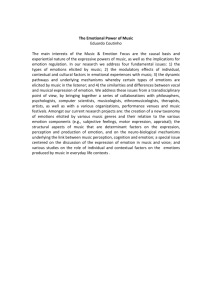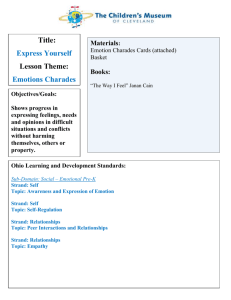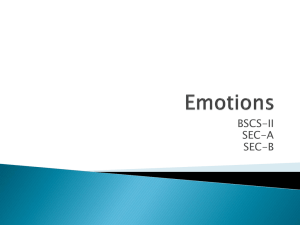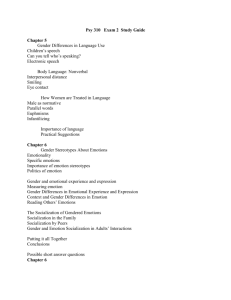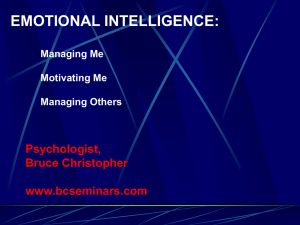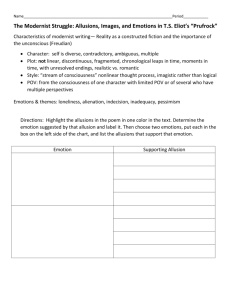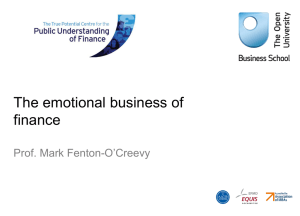Discuss how social or cultural factors affect one cognitive process.
advertisement
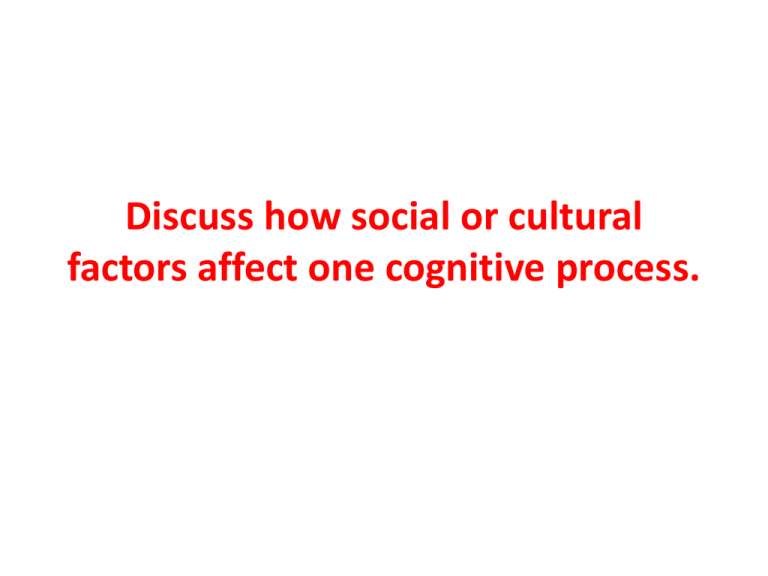
Discuss how social or cultural factors affect one cognitive process. What is culture? Wang and Ross (2007) said that culture is.. 1. A system (values, schemas, artifacts) 2. A process (rituals, daily routines and practices) Culture and Memory • Culture affects how people remember, why they remember, when they remember, what they remember and whether they find it necessary to remember at all. Did we GTL yet or not? Did we shoot them in the head? • In memory studies where participants are asked to memorize random words that are NOT related to each other, people from Western cultures usually do better. • Why? • Such tasks are meaningless to nonWestern people. Swazi Herdsman and Memory • Our old buddy Bartlett (1932) claimed that Swazi herdsman were got all Will Hunting about their cattle. • Since there culture revolved around cattle, they had an extraordinary memory to recognize and care for their cows. Another more culture and memory example…. • Roger and Waddel (1982) compared the memory of Mayan kids to kids from the good ol USA. • Made a model of a Mayan village. • Made 80 little plastic figurines of stuff you would find in the village. The Mayans vs USA…Memory showdown!!!! • They then put 20 of the figures in the model village and let he kids look at it. • Then they took out the 20 figures and put them back with the other 60. • Asked the kids to recreate the village with the 20 figures in it. • Who did better? The freaking Mayans!!!! Why? • Maybe because their culture (and schemas) were more suited towards memorizing their own village. • If it was recreate items from Snooki’s closet we would have taken them! So….. • We all memorize the same…we all have a brain (the same hardware) • But context (software) matters when trying to remember stuff. Uno ejemplo mas of how culture can effect cognition. Individualistic Culture • Focus on yourself • encouraged to express emotions because it is viewed as unique and shows individual and distinctive qualities. Collectivistic Culture • Focus in on the group • discourages the expression of emotions, seen as unimportant and is often disregarded of. Korea vs. USA Who is more emotional? Rime et al.did a study where they discovered that…. • 20% of Koreans (collectivist country) never shared their emotional experiences. • Compared to only 5% in the US (individualist country). • They hypothesized that Suppression of emotional experiences can lead to memory impairment. Emotional movie study by… Richards & Gross Aim: • Investigate whether the regulation of emotion will affect memory. Procedure: • 53 subjects were split into 2 groups • One group was told to suppress their emotion while watching a film about and argument between two parents with the presence of a little girl. • The other group was asked to watch the film. Richards & Disgusting (Gross…get it, I am just really tired now). Results: • The group that was suppressing their emotion throughout the film (regulation of emotion) had poor recall. • They did a natural observation and compared the memory of those who regulate and freely express their emotions. • Those who express their emotions have better memory. Why did suppressing their emotion zap their memory? • The Cognitive Cost of regulating emotions took up the capacity for memory encoding. • Those who express their emotions have better memory. Was this a good study? • Ecological validity was low in the initial experiment, because it was in lab conditions. • Their methodology not scientific so they make a big assumption that regulating emotion took up the capacity of memory encoding.




